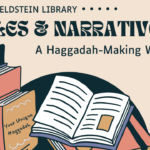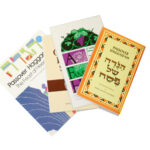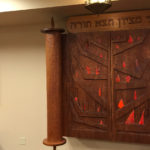A Passover Message from Rabbi Kosak

Passover Eternal: Why the Story of Redemption Is Told Through Ritual
After college, I moved to northern New Mexico, which was home to what was then called the Three Cultures; this was a way of recognizing the presence of the Native American peoples, those of Hispanic ancestry, as well as the Anglos. Each group had its own collection of rituals and practices, yet in addition to them, there was also a group of New Age practitioners who used crystals, herbs, dancing, and New Age music to create one-off types of experiences. For a New York Jewish kid, this rich amalgam of people and cultures was eye-opening, and widened my understanding of what ritual was.
In particular, my New Age friends introduced me to the fact that individual and not-to-be-repeated moments can be ritualized by adding sacred, emotion-laden practices. This stood in distinction to the manner in which religions preserve rituals so that the uniqueness of the present moment is joined with ancient forms and meanings.
As we approach Passover this year, it’s worth reflecting on the changing conditions in which we have celebrated our festival of freedom over the last decade and a half. The plagues of the Seder were replaced by a continuing series of modern pestilence related to economics, racial justice, environmental catastrophe, ultra-nationalism, and antisemitism. Looking at America alone, the financial meltdown of 2008 continued to impact the country through the early 2010s, leading to the Occupy Wall Street Movement. 2013 saw the birth of the Black Lives Matter movement in response to the murder of Trayvon Martin and the acquittal of his murderer, George Zimmerman.
The 2016 presidential election pushed the populist Donald Trump into the White House, highlighting the immense stresses dividing America. Portland, of course, became a center of national attention beginning on May 28, 2020, through that October as protests over the death of George Floyd closed much of the downtown.
Meanwhile, we witnessed hurricanes of increasing intensity: Harvey, Irma, Maria, and Michael, which was the first Category 5 storm to make landfall in a quarter century. A different sort of storm, that of terrorism, continued to grip the globe in its throes. In the U.S. alone, the Boston Marathon attack was followed by the horrific shooting at the Pulse Nightclub in Orlando, Florida, which targeted a group of dancers simply because they were gay. Mass shootings in our schools persisted: Sandy Hook Elementary School and Marjory Stoneman Douglas High School, to mention just two.
And then there was the pandemic, which for many people was their deepest experiential lesson in bondage.
The psychic weight of these events was such that many of us needed to include them in our Seders. We wanted redemption from these horrors; we wanted to know that there was a way out. By incorporating them into our family celebrations, we ritualized them, joining the singular event to the eternal narrative of freedom through rituals old and new. Similarly, this year it is inconceivable that October 7th won’t figure in many sederim, along with the frightening appearance of antisemitism in every corner of American society.
There’s a necessary caveat to our national fascination with the ritualization of disaster; thankfully, our Talmudic sages already addressed this for us. In an early editing discussion, they questioned in what order the Haggadah’s Pesach narrative should be recounted. Should it begin with freedom and then flash back to the slavery that preceded it? Or should it begin in the darkest hour, only slowly wending its way to our national redemption. They decided “Mat’hil big’nut um’sayyem b’shevach.” We should “begin with our national disgrace but finish with praise.” On a simple chronological level, this makes sense since the Exodus story does begin with slavery. Yet the rabbis of the Mishnah who created this dictum were living in a time of national crisis, just as Jews and Israelis today are living through a period of crisis. If our rituals are meant to speak profoundly to our condition while recognizing where our heads and hearts are, it’s not so clear that ending with the joy of Hallel and freedom properly portrays our moment. Putting this more bluntly, how willing are we to celebrate? Can we focus on how the world constantly pulses with the possibility of freedom and redemption, or like drivers passing by a four-car pile-up, do we capitulate to our desire to rubberneck? Are we willing to overcome the human desire to catastrophize? That is both a personal and a national question.
For our sages, however, this became a mitzvah, a genuine command. We have an obligation to build into our Seders a pathway that allows us not only to live with hope, but more importantly to recognize that despite everything happening in the world, this very moment is a time of joy, celebration, and emotional expansiveness. Like those New Age practitioners in New Mexico, we must commit ourselves to joining new and old so that we, too, can ritualize a pathway from disgrace to praise and from despair to hope. We can run slipshod over our rituals so that they are little more than empty scripts, or we can embrace the tremendous power they contain to transform ourselves, our friends and families, and perhaps even our communities.
How will you do that this year?
Shtar Harsha’ah: Document of Authorization for the Sale of Hametz – Due by Monday, April 22nd, 10:00am.

Passover Services
Candle lighting:
4/22: 7:48pm | 4/23: 8:56pm | 4/24: 8:58pm | 4/26: 7:54pm | 4/27: 9:02pm (Havdallah) | 4/28: 7:56pm | 4/29: 9:05pm | 4/30: 9:07pm (Havdallah)
- *Pesach Day 1 Service – Tuesday, April 23, 9:30am – Stampfer Chapel/Livestream
- *Pesach Day 2 Service – Wednesday, April 24, 9:30am – Stampfer Chapel/Livestream
- Morning Minyan Chol HaMoed Pesach – Thursday-Friday, April 25-26, 7:00am – Zidell Chapel/Zoom
- Shabbat Pesach Service – Saturday, April 27, 9:30am – Stampfer Chapel/Livestream
- Sunday Morning Minyan Chol HaMoed Pesach – Sunday, April 28, 8:45am – Zidell Chapel/Zoom
- *Pesach Day 7 Service – Monday, April 29, 9:30am, Stampfer Chapel/Livestream
- *Pesach Day 8 Service & Yizkor – Tuesday, April 30, 9:30am, Stampfer Chapel/Livestream
Passover 5784: Information

Nibbles and Narratives: A Haggadah Workshop
Sunday, March 17, 2:00-4:00pm
It’s not too early to prepare for your Passover seder! Join Librarian Leora and Rabbi Eve to kick-start the creation of your own Haggadah. Drawing from the Feldstein’s Library’s eclectic collection of Haggadot, we’ll provide all the materials you need to create your one-of-a-kind Haggadah to bring extra meaning to your Passover seder.
Enjoy snacks, drinks, and a lovely afternoon with your kehillah. This workshop is recommended for 12 and up.
Questions? Please contact Leora Troper: ltroper@nevehshalom.org

The Great Haggadah Exchange
Sunday, April 14, 2024 1:00-2:00pm, Feldstein Library
Join in the Great Haggadah Exchange!
Do you have an excess of unused haggadot? Are you looking to try some new ones? Bring your relatively clean/not too stained, but no-longer-wanted Haggadot to the library. Pick up some new (to you) ones to enhance your seder this year.
For questions or more information, contact Leora Troper at ltroper@nevehshalom.org

Passover “Siyyum”
Monday, April 22, Time: 7:00am as part of Morning Minyan
Zidell Chapel
On the morning of the Pesach seder, firstborn children are required to fast in commemoration of the firstborn Egyptians who lost their lives during the tenth plague. Our fasting beautifully demonstrates our compassion even for our enemies. That said, we have another tradition to mark when we complete a book of Jewish learning with a celebratory meal. This “siyyum” overrides the fast for those who attend the study session.
Rabbi Daniel Pressman will be leading this year’s Siyyum with a discussion on Jewish ethics.
While in-person is preferred for this study session, those who need can join in on Zoom by clicking here.

REGISTRATION IS CLOSED – WE ARE AT MAX. CAPACITY
CNS’s 2nd Night Community Passover Seder
Tuesday, April 23, 5:00pm, Birnbach Hall
Gather round the table with Rabbi David Kosak and your Neveh Shalom kehillah for a 2nd night seder. We’ll enjoy reading from the haggadah while having opportunities to engage beyond the text with meaningful interactive activities and discussions. While this is a family-friendly event, we encourage you to bring quiet activities so your children are happy and engaged.
Price for CNS Members:
$54/adult (13+) | $40/Child (ages 3-12) | 2 and under free
Scholarships are available.
Price for Non-Members:
$60/adult (13+) | $45/Child (ages 3-12) | 2 and under free

PDX Young Adult Seder
Saturday, April 27, 6:00pm
Hosted at Congregation Beth Israel
Raise a glass (or four) at Portland’s Young Adult Seder. This musical, interactive Seder experience, led by Congregation Benth Israel’s Cantor Rayna Green, is a great way to connect with Jews in their 20s and 30s across the Portland area while enjoying a light Passover meal. $18/person, age 21 and over. This is a child-free gathering (but we hope to have family-friendly events in the future!).
Register by Monday, April 22nd at https://bethisraelpdx.shulcloud.com/form/youngseder
Please email chelsea@bethisrael-pdx.org with any questions!
Cosponsored by: Jewish Federation of Portland, Congregation Neveh Shalom, Portland Jewish Connection, Moishe House Pod

Tikkun Olam Project:
Harvesting Hope – Food Drive for Migrant Workers
Empty your pantry of chametz and other unopened, non-perishable food items by donating them to Friends of Seasonal & Service Workers to benefit migrant workers. This action will share the blessings of freedom with the marginalized members of our community, some of whom have probably harvested the same vegetables we have on our seder plates.
Drop off items in the bin in the Admin. lobby or bring them to any CNS Pesach event now through May 1.
Preferred items: White rice, Dried pinto beans, Canned beans (all types), Cooking oil (all types), Bread (all types), Pasta (all types), Canned fruits and veggies, and Jams and Jellies
*Only bring chametz items to the synagogue prior to the start of Passover. We do not encourage our congregants to handle chametz during the holiday.

Mimouna Celebration: A Post-Passover Moroccan Tradition
Thursday, May 2, 5:00-9:00pm
People of all ages and walks of life are encouraged to join us for our festive Mimouna – a unique and joyous celebration of the conclusion of Pesach with festive crafts, Moroccan desserts, music, dance, and henna. As it is said customarily said at Mimouna: “Tirbaḥu vetis’adu” – we wish you success and luck!
$10/per adult, $5/child (ages 2-18)
Co-sponsored by Keruv Levavot and Hillel


Try a New Dish for Passover
The Feldstein Library has a collection of Passover cookbooks for all kinds of tastes. Below is just a sample. Come and check one out!
- Passover Lite: Kosher Cookbook by Gail Ashkanazi-Hankin features almost 200 recipes that are delicious, Passover-observant, healthy, and easy to make.
- In Passover by Design by Susie Fishbein, you can find elegant and imaginative Passover recipes, as well as ideas for setting a fun and beautiful seder table. Over 130 of the recipes are also gluten-free.
- Perfect for Pesach by Naomi Nachman, presents easy recipes that use innovative flavor combinations to create fabulous gourmet dishes that you’ll want to cook all year.
- Zell Schulman’s Let my People Eat! offers a guide for those who may be less familiar with preparing for Pesach and running a seder. Besides yummy recipes, her book includes “lists, explanations, and sources for everything from ceremonial objects to stocking your Passover pantry.”



